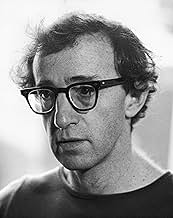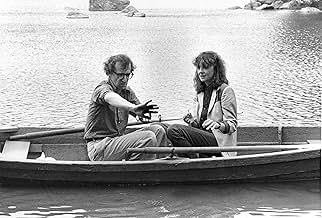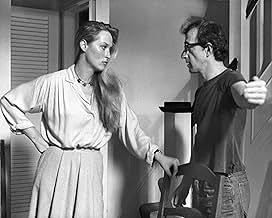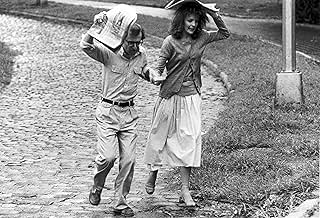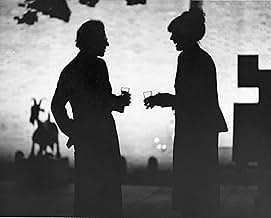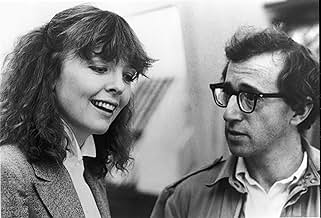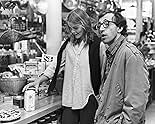Manhattan
- 1979
- Tous publics
- 1h 36m
IMDb RATING
7.8/10
152K
YOUR RATING
The life of a divorced television writer dating a teenage girl is further complicated when he falls in love with his best friend's mistress.The life of a divorced television writer dating a teenage girl is further complicated when he falls in love with his best friend's mistress.The life of a divorced television writer dating a teenage girl is further complicated when he falls in love with his best friend's mistress.
- Nominated for 2 Oscars
- 16 wins & 24 nominations total
Anne Byrne Hoffman
- Emily
- (as Anne Byrne)
- Director
- Writers
- All cast & crew
- Production, box office & more at IMDbPro
Featured reviews
From a technical standpoint, this film is top-notch - the acting is brilliant, the cinematography is beautiful, and the George Gershwin soundtrack is excellent.
But the content of the film is another thing. Basically, Woody Allen comes across as an egomaniacal creep who writes parts for himself in order to make him look like he's God's gift to women (there are so many references to his sexual prowess one could start a group drinking game based off it).
And anybody with even a beginner's understanding of adolescent psychological development knows that men who pursue teenage girls are sick and sadistic bastards who find joy in ruining promising young lives.
So my summary is: Like the film for its craft, but loathe the creator for his statement.
But the content of the film is another thing. Basically, Woody Allen comes across as an egomaniacal creep who writes parts for himself in order to make him look like he's God's gift to women (there are so many references to his sexual prowess one could start a group drinking game based off it).
And anybody with even a beginner's understanding of adolescent psychological development knows that men who pursue teenage girls are sick and sadistic bastards who find joy in ruining promising young lives.
So my summary is: Like the film for its craft, but loathe the creator for his statement.
After the phenomenal success of 'Annie Hall,' the hilarious Oscar-winning comedy detailing the romantic exploits of neurotic Jewish comedian Alvey Singer, Woody Allen had become of America's most respected filmmakers. In 1979, he released what is generally accepted as his second great masterpiece, 'Manhattan,' a poignant tribute to the city that Allen loves so dearly. Written by Allen and his 'Annie Hall'-collaborator Marshall Brickman, 'Manhattan' stars Allen as Isaac Davis, a twice-divorced, 42-year-old comedy writer who is intimately involved with a 17-year-old high school student, Tracy (an Oscar-nominated Mariel Hemingway). Meanwhile, Isaac begins to fall for Mary (Diane Keaton), who is the secret mistress of his best friend (Michael Murphy). Adding to all of Isaac's troubles, his former second wife, Jill (Meryl Streep), who had originally left him for another woman, has plans to write a tell-all book on their failed marriage.
If this all seems very confusing to you, then you're not alone. Just as in 'Annie Hall,' Allen plays the hopeless romantic who is struggling desperately to understand the maddening complexity of human relationships. Though Tracy is only seventeen years old, she is arguably the most honest and mature of the women in Isaac's life; nonetheless, he doesn't treat her seriously. In his mind, anything that she says is quite obviously influenced by the naivety and downright ignorance of the young. Their relationship was never meant to be anything more than a brief "fling," and so he feels no guilt for seeing another woman behind his back, an act that makes him livid when it ultimately happens to him.
'Manhattan' was shot in beautiful crisp black-and-white by Gordon Willis, who has also worked on, among countless other films, 'Annie Hall' and the three installments of 'The Godfather.' The cinematography offers New York City a romantic 1940s feel, reminiscent of how Allen claims to remember the city as a child: "Maybe it's a reminiscence from old photographs, films, books and all that. But that's how I remember New York. I always heard Gershwin music with it, too. In 'Manhattan' I really think that we that's me and cinematographer Gordon Willis succeeded in showing the city. When you see it there on that big screen it's really decadent."
Mysteriously, this film remains the least-liked by the director himself, though, at the same time, it was also his most commercially successful. As you've no doubt already noticed from this review, 'Manhattan' is often likened to 1977's 'Annie Hall,' perhaps due to the repeated casting of Allen and Keaton (a not uncommon occurrence) or its similar attempt to uncover the elusive secrets behind love and relationships. In terms of film-making style, however, the films are quite dissimilar. Unlike the highly-energetic 'Annie Hall' which cut back and forward in time, visited old memories, broke the fourth wall and made conversations with passing extras 'Manhattan' boasts a more classical approach quiet, softly-spoken and accompanied by a wistfully slow jazzy soundtrack, also relying heavily on the works of George Gershwin.
If this all seems very confusing to you, then you're not alone. Just as in 'Annie Hall,' Allen plays the hopeless romantic who is struggling desperately to understand the maddening complexity of human relationships. Though Tracy is only seventeen years old, she is arguably the most honest and mature of the women in Isaac's life; nonetheless, he doesn't treat her seriously. In his mind, anything that she says is quite obviously influenced by the naivety and downright ignorance of the young. Their relationship was never meant to be anything more than a brief "fling," and so he feels no guilt for seeing another woman behind his back, an act that makes him livid when it ultimately happens to him.
'Manhattan' was shot in beautiful crisp black-and-white by Gordon Willis, who has also worked on, among countless other films, 'Annie Hall' and the three installments of 'The Godfather.' The cinematography offers New York City a romantic 1940s feel, reminiscent of how Allen claims to remember the city as a child: "Maybe it's a reminiscence from old photographs, films, books and all that. But that's how I remember New York. I always heard Gershwin music with it, too. In 'Manhattan' I really think that we that's me and cinematographer Gordon Willis succeeded in showing the city. When you see it there on that big screen it's really decadent."
Mysteriously, this film remains the least-liked by the director himself, though, at the same time, it was also his most commercially successful. As you've no doubt already noticed from this review, 'Manhattan' is often likened to 1977's 'Annie Hall,' perhaps due to the repeated casting of Allen and Keaton (a not uncommon occurrence) or its similar attempt to uncover the elusive secrets behind love and relationships. In terms of film-making style, however, the films are quite dissimilar. Unlike the highly-energetic 'Annie Hall' which cut back and forward in time, visited old memories, broke the fourth wall and made conversations with passing extras 'Manhattan' boasts a more classical approach quiet, softly-spoken and accompanied by a wistfully slow jazzy soundtrack, also relying heavily on the works of George Gershwin.
Let me get this out of the way: I'm a big Woody Allen fan. And this flick is absolutely and utterly his. From the black and white to the ambience and, of course, the dialog, it all screams Woody Allen as loud as it can.
As most of his movies, Woody is not simply playing a character, nor simply being himself. It is a mix, a blend between a real man and a made up persona. And, as always, the line is weirdly blurry, making it so, at times, you're watching a documentary.
The plot itself is not the central point of the story and, at times, it is hard to understand exactly what it is leading to. No, the focus of the story is the characters. Characters like Isaac, Yale and the city. Specially the city. It is an homage to a now distant past of history, viewed from the lens of a troubled mix of a real and fictional man.
It is hard to defend most of Isaac's actions. And it is way harder to get mad at them. It is a movie about imperfection, ego, society, intellectuals and love. And it is great. A great movie to be rewatched as many times as you can.
I watched Manhattan recently because i had never seen Woody Allen's films and heard this was one of his best.
I can see why people love this film, it certainly is quite original and a convincing snapshot of a group of friends in New York, but I found Woody's character just too excruciating self-possessed and irritating to enjoy the film overall.
I guess you either love him or hate him, but he reminded me of George Costanza on Seinfeld - i just wanted to shake him and say 'get over yourself!'.
As for the humor, there were a lot of attempted wit there but nothing that made me laugh out loud. I won't be a hurry to see any of his other films.
I can see why people love this film, it certainly is quite original and a convincing snapshot of a group of friends in New York, but I found Woody's character just too excruciating self-possessed and irritating to enjoy the film overall.
I guess you either love him or hate him, but he reminded me of George Costanza on Seinfeld - i just wanted to shake him and say 'get over yourself!'.
As for the humor, there were a lot of attempted wit there but nothing that made me laugh out loud. I won't be a hurry to see any of his other films.
I used to hold this film as somewhat of a sacred cow when I first saw it in 1979. I was a proscribed Woody fan and
although I still like a few of his movies, this is no longer one of them, on recent review.
I recently purchased copies of Manhattan and Annie Hall.
I watched the latter first and it charmed my socks off again. One classic scene after another signals the height of Allen's art in this hilarious masterwork. Manhattan is a different story.
Perhaps my recent viewing of Wild Man Blues has hipped
me to what an whining, pampered egomaniac Mr. Allen is.
Perhaps it's the irony of his Chaplin-like dalliances with young women that have set me against him. But I now watch Manhattan
and see a pathetic, overblown Allen literally feeding lines to his
fellow actors to give him some smarmy comeback that never fails to show how intellectually superior he is. Different from Annie Hall, Allen is no longer the underdog but an ugly, obnoxious
over-lord...
His characters in Manhattan, are cardboard. They are not real and
the situations are not real. I have no feeling for anyone in this
movie, except Woody, who I feel contempt for, given his massive
and unfunny self-indulgence. It's pathetic to see Allen set up
Hemingway with lines that a teenager would never say in a million
years, just to trump up his flaccid ego. Everyone in this movie actually feeds him lines to trump up his ego.
Like Stardust Memories, this one shows Woody at his self- indulgent worst. This movie looks wonderful and sounds wonderful with the Gershwin score, but on further review, this
one's hollow and ultimately a maddening tribute to an egomaniac.
although I still like a few of his movies, this is no longer one of them, on recent review.
I recently purchased copies of Manhattan and Annie Hall.
I watched the latter first and it charmed my socks off again. One classic scene after another signals the height of Allen's art in this hilarious masterwork. Manhattan is a different story.
Perhaps my recent viewing of Wild Man Blues has hipped
me to what an whining, pampered egomaniac Mr. Allen is.
Perhaps it's the irony of his Chaplin-like dalliances with young women that have set me against him. But I now watch Manhattan
and see a pathetic, overblown Allen literally feeding lines to his
fellow actors to give him some smarmy comeback that never fails to show how intellectually superior he is. Different from Annie Hall, Allen is no longer the underdog but an ugly, obnoxious
over-lord...
His characters in Manhattan, are cardboard. They are not real and
the situations are not real. I have no feeling for anyone in this
movie, except Woody, who I feel contempt for, given his massive
and unfunny self-indulgence. It's pathetic to see Allen set up
Hemingway with lines that a teenager would never say in a million
years, just to trump up his flaccid ego. Everyone in this movie actually feeds him lines to trump up his ego.
Like Stardust Memories, this one shows Woody at his self- indulgent worst. This movie looks wonderful and sounds wonderful with the Gershwin score, but on further review, this
one's hollow and ultimately a maddening tribute to an egomaniac.
Did you know
- TriviaMeryl Streep shot her scenes during breaks in filming Kramer contre Kramer (1979).
- GoofsIn the first scene at Elaine's, as Isaac is beginning to say something, two people (presumably customers of the restaurant, as it was running while they were shooting) walk in front of the camera. Isaac laughs, and quickly recovers with an impromptu remark about how his girlfriend has to go and do homework.
- Quotes
Isaac Davis: All the times I come over here, I can't understand how you can prefer her to me.
Jill: You can't understand that?
Isaac Davis: No. It's a mystery to me.
Jill: Well, you knew my history when you married me.
Isaac Davis: I know. My analyst warned me, but you were so beautiful that I got another analyst.
- Crazy creditsOne of the very few Woody Allen films to not have traditional opening credits, save the production company bumper (United Artists), and the film title MANHATTAN is seen as a long vertical flashing bright neon sign, located on the side of a New York City building, and is seen for under seven seconds just before Woody Allen narrates his first line.
- ConnectionsEdited into Intimate Portrait: Diane Keaton (2001)
- SoundtracksRhapsody in Blue
(1924)
Music by George Gershwin
Performed by The New York Philharmonic
Conducted by Zubin Mehta
Piano soloist: Paul Jacobs
Music director: Zubin Mehta
Details
- Release date
- Country of origin
- Language
- Also known as
- Chuyện Tình Manhattan
- Filming locations
- Production company
- See more company credits at IMDbPro
Box office
- Budget
- $9,000,000 (estimated)
- Gross US & Canada
- $39,946,780
- Opening weekend US & Canada
- $485,734
- Apr 29, 1979
- Gross worldwide
- $40,194,067
- Runtime
- 1h 36m(96 min)
- Color
- Sound mix
- Aspect ratio
- 2.39 : 1
Contribute to this page
Suggest an edit or add missing content


